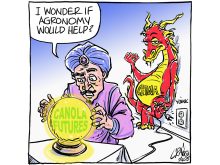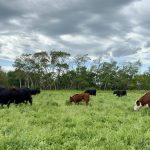The political battle over the Canadian Wheat Board is certainly nothing new.
We live in a capitalist system where farmers produce food as long as they can make a profit and it is distributed according to ability to pay. No matter how hard farmers work, as a rule they receive a declining share of the consumer’s food dollar.
Canadian farmers have always known that when it comes to political and economic power, they cannot equal that of finance capital, the farm supply industry and the food processing and distribution corporations.
Read Also

Farm groups are too amiable with the federal government
Farm groups and commodity groups in Canada often strike a conciliatory tone, rather than aggressively criticizing the government.
Farmers and peasants the world over have adopted various strategies to try to defend their interests. At first, where they were quite numerous, they formed political organizations and political parties. This worked to some degree but failed to halt the decline in their numbers.
The alternative strategy was to form producer and consumer cooperatives, credit unions, farmer-owned processing industries and marketing boards.
Throughout the Commonwealth at the time of the Great Depression, governments passed legislation granting farmers the right to form marketing boards. Farm commodity organizations petitioned governments, producer referendums were held and single desk marketing boards were established when a majority said yes. The democratic majority ruled: farmers were required to sell all their product through the chosen board.
Tree fruit growers first created co-op packing plants in British Columbia’s Okanagan Valley, where I was an orchardist, but the corporate food distribution and processing companies just played one against the other. The growers petitioned the provincial government, a referendum passed by a large majority and the single-desk B.C. Tree Fruits Marketing Board (BCTF) was created. The growers then created Sun Rype to try to break the food processing oligopoly.
However, BCTF was not a supply management board. It could not control fruit imports being dumped into Canada and was in a weak position when bargaining with large food distributors. Prices lagged behind costs. Most growers could not survive without the income their family earned off-farm.
There have always been farmers who resent selling their product through a single desk marketing board. In the Okanagan, they were mostly the larger farmers who were able to cherry-pick the better markets and out-compete their neighbours.
They began to peddle their quality product to special markets, leaving the balance of their crop to be sold by the marketing board. BCTF had no ability to enforce the legal system. A number of farmers blamed the board for the cost price squeeze and demanded that the provincial government end BCTF’s status as a single marketing desk.
The “fruit wars” came to a crisis point in 1972. A referendum among growers was held in December 1973, and 62 percent voted to keep the existing single desk. However, the NDP government concluded that the majority was not strong enough, and legislated the end to a compulsory board.
The number of growers declined from a peak of 3,000 to roughly 500 commercial growers today. The acreage under tree fruit production has dropped significantly, from 26,000 to 10,000 acres.
Okanagan farms are now bought by wealthy people who have no interest in farming. Our 15-acre orchard sold a couple of years ago for $1.5 million. The fruit trees were removed, and only a few acres of grapes were planted.
Other farmers have switched to growing grapes, and there are now many small hobby grape growers and wine producers. Our co-op packing house closed because it did not have enough tonnage to cover costs. Sun Rype has been sold to private investors.
There is no guarantee that the retention of BCTF as a single marketing desk would have prevented the demise of the tree fruit industry. However, for family farmers who were too busy farming to have the time to sell their own product, it was a big help.
Warnock is retired from teaching political economy and sociology at the University of Regina and is author ofThe Politics of Hunger: the Global Food Industry.He and his family were also commercial fruit growers in the Okanagan Valley.














